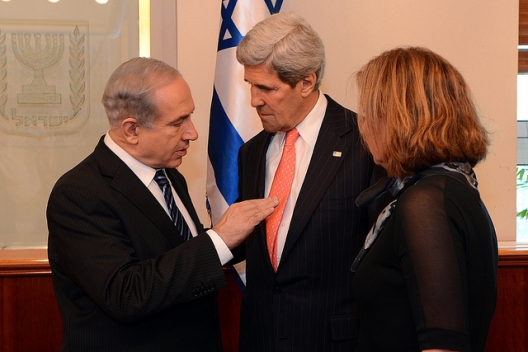 Until a few weeks ago, a small army of critics and armchair quarterbacks took aim at Secretary of State John Kerry’s first months in office in roughly similar fashion — too much globe-trotting, too many meetings, and too singular a focus on the lost cause of diplomacy — the 65-year search for an Israeli-Palestinian agreement. Kerry thus deserves more than a little credit with this week’s resumption in Washington of the first meaningful talks between Israel and the Palestinian Authority since 2008.
Until a few weeks ago, a small army of critics and armchair quarterbacks took aim at Secretary of State John Kerry’s first months in office in roughly similar fashion — too much globe-trotting, too many meetings, and too singular a focus on the lost cause of diplomacy — the 65-year search for an Israeli-Palestinian agreement. Kerry thus deserves more than a little credit with this week’s resumption in Washington of the first meaningful talks between Israel and the Palestinian Authority since 2008.
It is a significant achievement, and it is largely his own. It is also indicative of how Kerry does business — with persistence, drive, energy, secrecy, and attention to detail, all at warp speed.
Kerry is putting diplomacy back on the map. He has embraced his role as America’s top diplomat and is reasserting America’s primacy in the two pivotal regions for US security — the Middle East and Asia. American secretaries of state are expected by the rest of the world to lead on the toughest issues as combination referee, dealmaker, and frequent flyer. Kerry has played those roles confidently since taking office in January.
He is also following former Secretary of State George Shultz’s advice to “tend the diplomatic garden.” In other words, it is important to show up in a distant capital with no immediate crisis to overcome. Demonstrating interest and respect and deepening personal connections with global leaders makes it more likely they’ll see things our way when we need them, as we invariably will. Kerry did not set out to break Hillary Clinton’s mileage record, but that may become one measure of his ultimate success.
In just six months, Kerry has delivered progress on some of America’s most important priorities. The Middle East talks are significant. If Kerry and his capable new envoy, Martin Indyk, can generate momentum on borders, Jerusalem, and settlements, it may create the best opportunity for progress since President Clinton’s 2000 Camp David talks. It is a long way from peace but a situation no one would have predicted even a month ago.
Further East, Kerry and Vice President Joe Biden, both recent visitors to New Delhi, have begun to revive a major aim of President George W. Bush — a strategic partnership with India in troubled South Asia. And, on North Korea, Kerry worked quietly and effectively with Beijing last March to contain Pyongyang’s erratic and unpredictable young leader, Kim Jung Un.
After Iraq and Afghanistan, Kerry is right to return diplomacy to the front ranks of US strategy. Critics impatient with Kerry’s six trips to the Middle East would do well to remember the time it took to create some of the most significant recent American diplomatic successes. Henry Kissinger spent well more than a year in executing his brilliant opening to China. After the fall of the Berlin Wall, James Baker worked nonstop for 10 months to achieve Germany’s stunning unification in NATO. And the Clinton administration required nearly three years to get Bosnia right before Richard Holbrooke brokered his masterful peace at Dayton.
The point is that diplomacy takes time. The veteran negotiator George Mitchell framed it best by reminding his own critics that, in Northern Ireland, he had “700 days of failure and one day of success” — the day he reached the Good Friday Agreement for peace.
Kerry has many more mountains to climb as secretary of state. The Iran nuclear challenge will return to the front burner following this week’s inauguration of President Hassan Rowhani. Kerry needs to decide whether he should take the lead in the first American direct negotiations with Tehran in decades. Reaching a compromise deal with Iran will require the same unyielding personal commitment he has given to Israeli-Palestinian peace. But it is the best way to avoid a military conflict in 2014. In addition, Kerry will need to push Congress toward a more effective US position on climate change. And, Kerry has an opening to strengthen our alliance with a resurgent Japan and maintain America’s predominance in Asia. Can he find a way, at the same time, to work effectively with China?
The challenges never go away. But Kerry is building in his first six months on the job a promising record of accomplishment in Foggy Bottom.
Nicholas Burns is professor of the practice of diplomacy and international politics at the Harvard Kennedy School of Government, and Atlantic Council Board director. He is faculty chair of the school’s Middle East Initiative, India & South Asia Program, and is director of the Future of Diplomacy Project. He served in the United States Foreign Service for 27 years until his retirement in April 2008. Follow him on Twitter @RNicholasBurns. This piece first appeared on The Boston Globe.
Image: John Kerry meeting with Israeli Prime Minister Netanyahu, May 23, 2013 (Photo: Flickr/US Embassy Tel Aviv/CC License)
